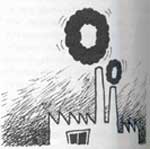A clean ideal
 WHILE world leaders squabbled over global strategies at the climate change summit in Berlin, an ambitious and significant effort was initiated in Tokyo between April 5-7, aimed at achieving a zero emission industrial situation. The founding of the "Zero Emissions Research Initiative" (ZERI) -- proposed earlier this year by the United Nations University (UNU), will take a step forward the research and educational "Agenda 21 for sustainable development".
WHILE world leaders squabbled over global strategies at the climate change summit in Berlin, an ambitious and significant effort was initiated in Tokyo between April 5-7, aimed at achieving a zero emission industrial situation. The founding of the "Zero Emissions Research Initiative" (ZERI) -- proposed earlier this year by the United Nations University (UNU), will take a step forward the research and educational "Agenda 21 for sustainable development".
The establishment of zeri, explains Heitor Gurgulino de Souza, Rector, unu, would ensure that the global productive forces can have access to the best minds, securing the manufacturing of goods without affecting the critical balance of the ecosystem.
The initiative's proponents argue that to be competitive in the 21st century be industry will have to redesign the modus operandi of production, opt for renewable raw materials and ultimately achieve the target of zero emissions. Industry is being assured that they would profit by eliminating wastes contributing towards sustainable development as well without being less competitive.
To many, this sounds rather idealistic and far-fetched -- if not outright utopian. Some environmentalists find it "really difficult to believe that the Northern countries would be willing to subscribe to this concept".
The ZERI has also been chided for not evolving a critique of the present consumption patterns, nor of call for changes in the attitudes and orientations necessary to combat industrial pollution and global warming.
But in spite of its doubtful feasibility, ZERI can still serve as a very useful platform for presenting alternative technologies and policy prescriptions, the protagonists assert.
Related Content
- Shaping a just transition to clean fuel-based energy sources
- Heavy-duty zero-emission vehicles: pace and opportunities for a rapid global transition
- Joint inspection report on GAIL India and ONGC units in Andhra Pradesh, 12/04/2021
- Fulfilling electric vehicle charging infrastructure needs in Greater London and its boroughs
- Coronavirus Disease 2019 (COVID-19): Standard Operating Procedure (SOP) for transporting a suspect/confirmed case of COVID-19
- Transforming the energy system: and holding the line on rising global temperatures
